|
|
|
Sort Order |
|
|
|
Items / Page
|
|
|
|
|
|
|
| Srl | Item |
| 1 |
ID:
146486
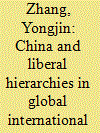

|
|
|
|
|
| Contents |
This article investigates the entanglement of the rising Chinese power with the liberal global order in negotiating for normative change. Drawing upon the English School theoretical perspective, it argues that three hierarchical constructs of liberal persuasion co-exist in and cohabit the global international society today. They are, namely, the legalized hegemony as seen in the UN Charter-based liberal pluralism; the changing normative order of emerging solidarist and anti-pluralist formation that purposively creates unequal sovereigns; and the liberal global governance order that moves predominantly in the direction of state-centric solidarism. As an emerging power with an authoritarian regime, China's entanglement with these liberal hierarchical constructs is multifaceted with complex dynamics. The article argues specifically that three differentiated strategic approaches have been developed by China in this entanglement: to defend liberal pluralism in the legalized hegemony; to contest liberal cosmopolitan anti-pluralism in the changing normative order; and to endorse state-centric solidarism with regard to the construction of a liberal global governance order. If they reflect a rising China's preferences of order construction, they also constitute an important part of China's engaging negotiations for normative change in international society. The agency China exercises in this regard helps explain the limited consensus among Great Powers as to the ‘central direction’ for the evolving global order. The preferences of China as the second among equals in the Great Power club matter greatly in understanding the contention between pluralism and solidarism in the changing raison de système of contemporary global international society.
|
|
|
|
|
|
|
|
|
|
|
|
|
|
|
|
| 2 |
ID:
079851
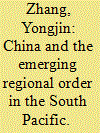

|
|
|
|
|
| Publication |
2007.
|
| Summary/Abstract |
As China rises, it has become increasingly aggressive in applying its soft power in the Pacific. What does China's arrival mean for the emerging regional order in the Pacific? What is it up to in the strategic backwater of the Pacific, which has traditionally been regarded as an 'American lake' and Australia's 'special patch'? Setting my analysis in the broad context of China's new global diplomacy, I argue that the pattern of China's assertive behaviour in the Pacific is no different from its approach to other regions in the global South. I further argue that with only limited strategic, diplomatic and economic investment in the Pacific, China has become a regional power by default. The arrival of China, therefore, is unlikely to provoke any new round of great power competition. Rather, it offers opportunities for the world's second most formidable development challenge.
|
|
|
|
|
|
|
|
|
|
|
|
|
|
|
|
| 3 |
ID:
173462
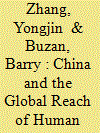

|
|
|
|
|
| Summary/Abstract |
This article examines the complex dialogical relationship between China and the global reach of human rights. It charts the transformation of China from a human rights exception and a human rights pariah state to an active participant in, and shaper of, global human rights governance. It looks at such transformation as dynamic social and political processes full of contradictions and the negotiated outcome of China's communicative engagement with “moral globalization” in a world morally divided on the meaning of human rights. It contends that the global reach of human rights understood as advancing rather than perfecting global justice will always remain contentious, as it is contingent on the possibility of open public reasoning across cultures and national boundaries in a global moral conversation. It also argues that China has resourcefully used the idiom of human rights for two specific purposes. One is to justify and rationalize its “developmental relativism” as an excuse for practices that condone continued political repression in China; the other is to internalize politics of contestation within the institutions of global human rights governance by shifting the centre of gravity of both the normative debate and the practical application of human rights.
|
|
|
|
|
|
|
|
|
|
|
|
|
|
|
|
| 4 |
ID:
140825


|
|
|
|
|
| Summary/Abstract |
This article critically explores the historical transformation of the normative structure of international order brought about by legitimacy contests, and unpacks how power is deeply implicated in legitimacy claims amid the ongoing normative transformation of contemporary international society by virtue of the vanishing American unipolarity. By situating the analytical concept of legitimacy at the centre of this inquiry, it examines China’s attempts to win and command social acceptance of the legitimacy of its rising power as it confronts the challenges posed by the changing normative structure of contemporary international society. The struggle for legitimacy of a rising power, it argues, provides an alternative analytical framework within which to understand how rising Chinese power contests and is contested by the liberal global order dominated by the United States, a question that has fascinated and consumed many realist, liberal, and constructivist scholars. China’s engagement with the politics of legitimation is central to China’s peaceful rise. A careful examination of China’s struggle for legitimacy can yield insights into important systemic consequences of the transformation of the normative structure of international society.
|
|
|
|
|
|
|
|
|
|
|
|
|
|
|
|
| 5 |
ID:
050148
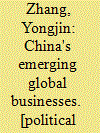

|
|
|
|
|
| Publication |
New York, Palgrave Macmillan, 2003.
|
| Description |
xiv, 286p.
|
| Standard Number |
0333999347
|
|
|
|
|
|
|
|
|
|
|
|
Copies: C:1/I:0,R:0,Q:0
Circulation
| Accession# | Call# | Current Location | Status | Policy | Location |
| 046797 | 338.88951/ZHA 046797 | Main | On Shelf | General | |
|
|
|
|
| 6 |
ID:
129627
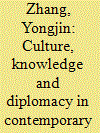

|
|
|
|
|
| Publication |
2014.
|
| Summary/Abstract |
The worlds that Matteo Ricci lived in-early modern Europe, Ming China and the pre-Westphalian international order-are vastly different from the world of the 21st century, when accelerated globalization binds China and Europe together as never before and when global international society is moving decisively beyond Westphalia. How much are the legacies of Matteo Ricci still relevant, 400 years on, to enriching the relationship between China and Europe in the 21st century? This paper starts with a brief overview of the civilizational encounters between China and Europe and the unfolding of their turbulent and often troubled relationship over the last four centuries of wars, collapse of empires, internal convulsions, nation-state building, scientific and industrial revolutions and great economic transformations. Against this historical narrative is the discussion of Matteo Ricci as a cultural agent, a knowledge broker and a practitioner of public diplomacy in fostering Sino-European relations in its nascent years. The paper argues that even in an increasingly globalized world, Matteo Ricci's conception of culture, his wisdom about the power of knowledge and his practice of people-to-people diplomacy remain valuable in informing both China and the EU, two aspiring global players, in their search for a viable China-EU strategic partnership.
|
|
|
|
|
|
|
|
|
|
|
|
|
|
|
|
| 7 |
ID:
156807
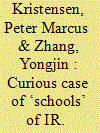

|
|
|
|
|
| Summary/Abstract |
This article interrogates the questions evoked by the curious case of ‘schools’ of thought in International Relations (IR) through the twin perspectives of the sociology of knowledge and geopolitics of knowledge. Drawing inspirations from the tradition of the sociology of IR pioneered by E. H. Carr, the paper first explores how geo-epistemic diversity can help understand the sociologically problematic nature of IR knowledge production in the existing discipline. Taking cues from Randall Collins’s sociology of philosophies, the article moves to identify four clusters of sociological conditions and dynamics that, we argue, facilitate the formation and sustain the operation of schools of thought in IR. Taking seriously the recent insight from geopolitics of knowledge, the article then looks at why and how school labelling constitutes a battleground for contestation and legitimation of knowledge. While the ‘core’ uses the school label to create a parallel, and explicitly inferior, universe of knowledge production to localize theoretical noises from the peripheries, the school label, we argue, has been proactively appropriated by those at peripheries and semi-peripheries for three strategic purposes: to engage in a purposely contentious politics, to question the claim of the American ‘core’ as the creator, depositor, and distributor of universal knowledge, and to unveil the geo-historical linkage between the political and the epistemic. School labelling matters, we further argue, because it has become a site of contestation of geopolitics of knowledge and reflects the perils and promises in our collective pursuit of constructing a truly global IR.
|
|
|
|
|
|
|
|
|
|
|
|
|
|
|
|
| 8 |
ID:
146483
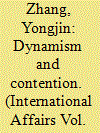

|
|
|
| 9 |
ID:
141222
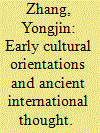

|
|
|
|
|
| Summary/Abstract |
A short commentary on Martin Wight’s ‘The Disunity of Mankind’, a short and unfinished piece in which Wight focuses almost exclusively on the Western tradition of thought, from Plato and Aristotle, to the Stoics and to Augustine.
|
|
|
|
|
|
|
|
|
|
|
|
|
|
|
|
| 10 |
ID:
131421
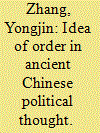

|
|
|
|
|
| Publication |
2014.
|
| Summary/Abstract |
Is there any significant International Thought in antiquity beyond the West? If there is, why has there as yet been no meaningful conversation between the expanding enterprise of theorizing International Relations (IR) today and ancient Chinese political thought? This extended version of my Martin Wight Memorial Lecture addresses these questions through a critical exploration of how a pivotal idea in ancient as well as contemporary international relations, namely, the idea of order, is deliberated in ancient Chinese political thought. Inspired by Martin Wight's profound scholarship so steeped in historical and philosophical depth, it investigates why and how alternative visions of moral, social and political order are imagined, offered and debated in ancient Chinese philosophical discourse. It examines the ways in which the moral and political pursuit of order as a social ideal is conducted in the anarchical society of states in ancient China. Through these historical and philosophical investigations, this article seeks to establish that ancient Chinese political and philosophical deliberations are rich in international thought and that classical thinkers in China's Axial Age are alive to us and contemporaneous with us philosophically as much as ancient Greek philosophers are. In establishing such a claim, the article calls for, and issues an invitation to, a conversation between the world of thought in ancient China and the theorization of IR as an intellectual ritual in search of a truly international theory.
|
|
|
|
|
|
|
|
|
|
|
|
|
|
|
|
| 11 |
ID:
079590


|
|
|
|
|
|
|
|